Homebrewing your own hard cider is fun, legal, and safe (that is, if you don’t imbibe too much). However, it is often the case that one will come across recipes for other kinds of homemade alcoholic drinks during the researching period. When I was looking into all the different ways to make hard cider, I came across applejack, which is a stronger form of hard cider. But, the further I dug, I discovered that there are questions as to whether applejack is legal, and even more questions regarding its safety.
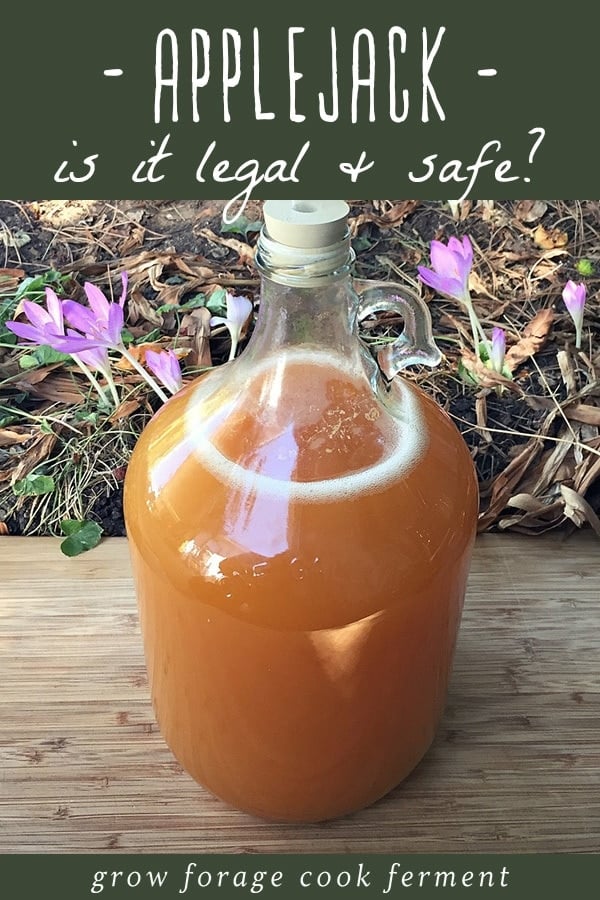
Want to save this post for later?
What is Applejack?
Applejack is basically a condensed form of hard cider. It is made by freezing the cider and removing the ice crystals that form.
Alcohol freezes at a much lower temperature than water, so it remains in a liquid state.
Applejack was historically made during colonial times, when large barrels of hard cider were left outside over the winter in the cold climates of New England.
Large chunks of ice would form and be removed, thereby concentrating, or “jacking” the cider.
Applejack was a whole lot easier to make than distilled liquors, and didn’t require any special equipment. This made it a very common and popular drink of its time.
Based on the amount of apples that we got off of our single tree, I can also imagine that this was a great way to not let a surplus of apples go to waste.
Is Applejack Legal?
This is the big question, and one that is not answered easily.
The term that is used most often when referring to the process of making applejack is freeze distillation. In the eyes of the law, distillation in any form is not legal.
But, to make matters more complicated, freeze distillation is not really distillation at all. The process is completely different, and the more appropriate term is freeze concentration.
In the United States, freeze concentration of beer is legal. It is called ice beer, or sometimes eisbier as it was originally produced in Germany.
There are some regulations on how much water you can freeze out of beer, but it is legal and can be made by homebrewers.
Why the laws wouldn’t be the same for hard cider is an interesting question, especially since the alcohol content of hard cider is often similar to beer.
I’ve seen in forums such as this reddit thread where others have contacted the TTB (Alcohol and Tobacco Trade Bureau) with questions on the legality of applejack. The response always seems to be that applejack is illegal, but ice beer is legal.
I tried to contact the TTB myself on more than one occasion to get a straight answer, but still haven’t received a response. If they do contact me, I will update this post with any information that they can provide.
Regardless, even if it is illegal (which it most likely is), I seriously doubt you’ll have any law enforcement knocking down your door for personal consumption of applejack.
But, you never know, and it’s still nice to know what the law is.
Is Applejack Safe?
This brings me to another point. Even if there weren’t any legal ambiguities, is this a drink that is worth the effort and, most importantly, is it safe?
I thoroughly love a nice glass of homebrewed hard cider. Every batch turns out a little bit different than the last, and that variation is nice.
Sometimes it’s a little funky, especially when using wild yeast, but I’ve never had a batch be completely undrinkable.
Freeze concentrating will amplify all of the flavors, good and bad, and produce an extra harsh drink that may or may not be enjoyable to drink.
Besides concentrating flavors, freezing will also concentrate methanol, fusel alcohol, and other impurities. True distillation separates these out, so isn’t a concern.
Methanol is highly toxic and unfit for consumption. This may be why drinking large amounts of applejack has such a reputation of being very harsh on your system and causing horrible hangovers.
Applejack has even been thought to cause “apple palsy” which can cause blindness.
There is some question as to how much methanol or other impurities are actually in hard cider (or homebrewed beer, wine, or mead) to begin with.
There may be little to none. But, if there is some in cider, freeze distilling it will make it more concentrated and possibly dangerous.
Should You Make Applejack?
Honestly that is up to you.
I tried making it once many years ago before I did much research, and the biggest hurdle for me was trying to fit a gallon of hard cider in my freezer.
Of course, if you live in a cold climate this isn’t so much of an issue, as you can just put it outside overnight in freezing temperatures.
Beyond that, I didn’t really care for how it tasted.
Then once I learned more about the possible illegality and safety issues, I decided to just enjoy my hard cider the way that it is. I don’t really feel the need to concentrate it.
But that’s just me.
I’m not here to tell anyone what to do or not to do, but I think a bit of knowledge about what applejack is, and if it’s legal and safe is important to put out there.
Have you ever made applejack or other freeze concentrated alcoholic beverages?
Tell me about your experience!
Apple Recipes & More
Try these tasty apple drinks and recipes with fresh apples this fall!
- Mulled Hard Cider
- Hard Apple Cider Jelly
- 12 Ways to Preserve Apples
- Spiced Apple Butter
- Hard Cider Made with Wild Yeast
- Homemade Apple Cider with a DIY Press
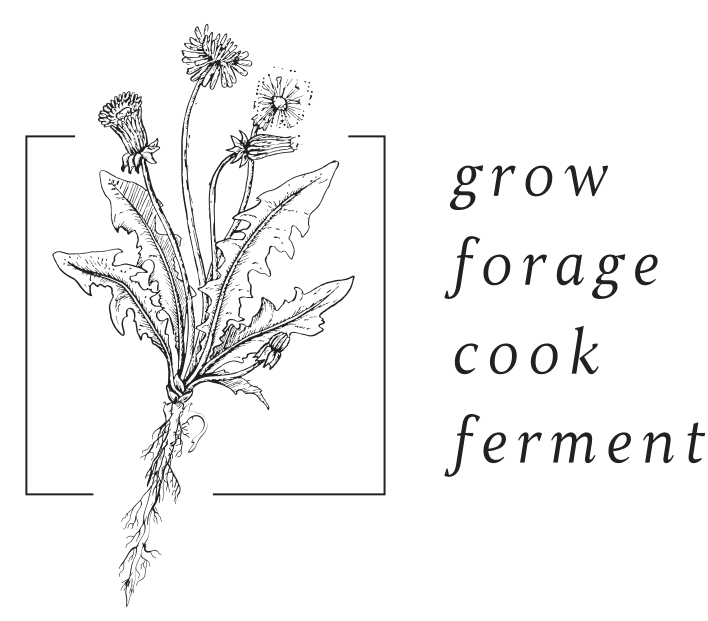
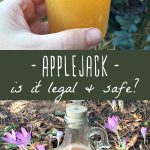
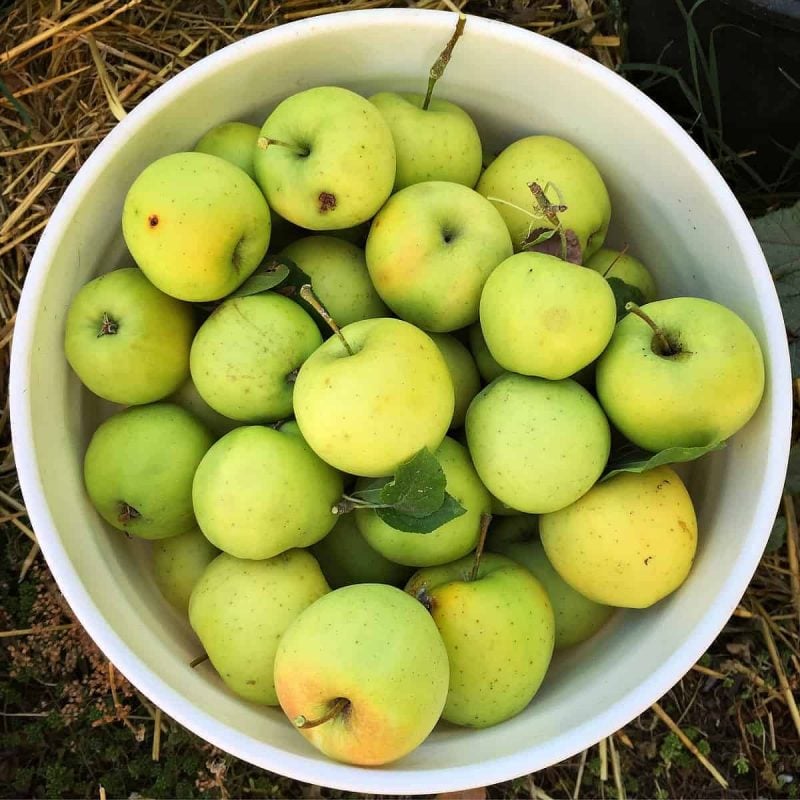
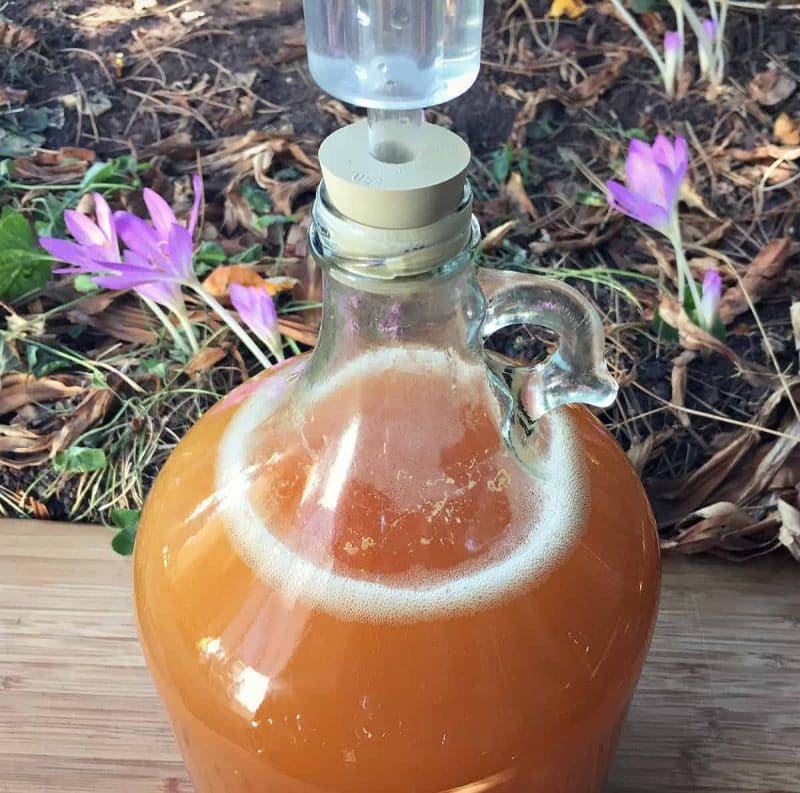
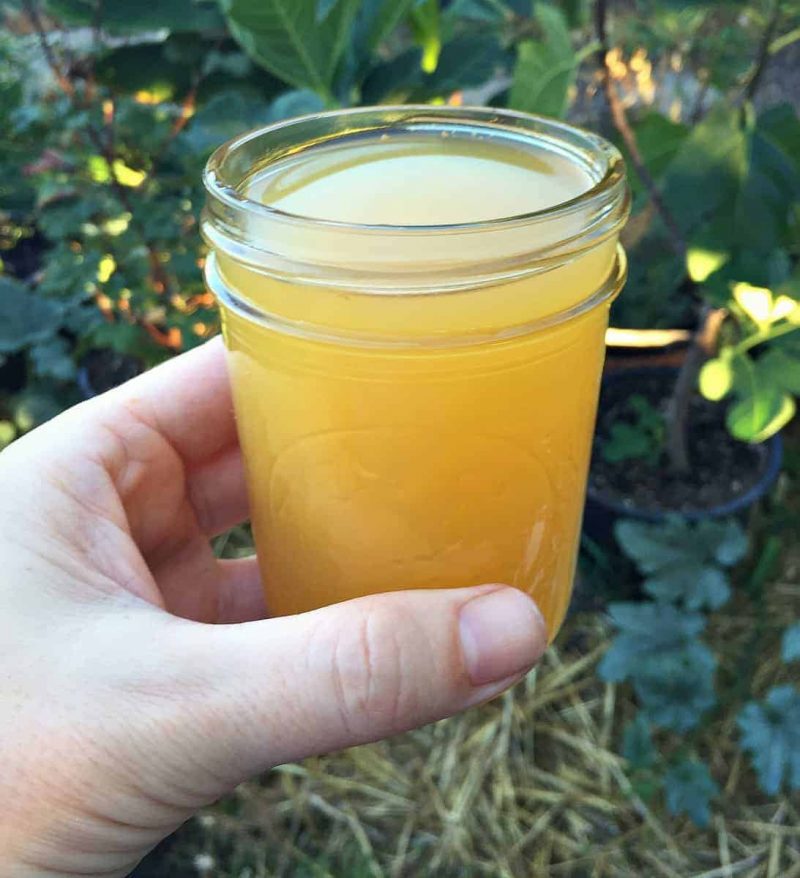

@Commuted: methanol boils at 148.5°, true. Water boils at 212 but you can evaporate at much lower temps.
Methanol will attach itself to water & other higher alcohols and will evaporate at about 116°F. If you get beverage distillation up to 148 you are totally out of control.
40 some years ago or more, I made applejack and took some to our after-work Christmas gather at the Tannery. Maintenance had to work Christmas week, while the plant was shut down for the holidays. After work, the last day, those of us there got together and passed around a jug or two. I had made a good batch of really sweet hard cider that year and froze two gallons. Must have gone down really well, I didn’t bring any home. As you have said, there were some big heads the next day. Wooowee! But it sure when down good.
Haha! What a great story, Charles. Thanks for sharing!
I made some apple jack a few years ago, almost by accident.
I had six US gallons of hard cider which I had bought at the press, and it was ready to be bottled.
Just then, I was called out of town (work) for what was expected to be a two-month stint. It occurred to me that if I froze the cider, I could thaw it and bottle when I got back. So I siphoned it into 1 gallon plastic jugs and managed to squeeze them into my freezer.
Back home 10 weeks later, I opened one of the jugs and found that it was full of a slush of frozen water and liquid alcohol. I simply took each jug and inverted it over a big Mason jar until I judged that most of the alcohol had drained out, but not until the frozen water melted.
The result was about a quart very strong stuff which, after about six months, was pretty drinkable.
Not a fan of strong spirits, I never drank enough of it at one time to experience a hangover. Nevertheless, I liked it well enough to drink it all, but although I haven’t gone blind yet, I doubt that I will try it again.
I wonder what could happen if you pasturize the apple jack on a open contIner. You will defenitly boiled off the methanol. Right?
No, unlikely to be a useful method. Heating your brew without being enclosed risks boiling off your precious ethanol. The evaporation temp is only about an 8° difference bw the two. Aside from this risk, you most likely would not boil off all the methanol bc this requires time. Consider that when you boil a pot of water, it doesn’t instantly all evaporate into the air but rather takes a considerable amount of time. Same goes for any other liquid but are different rates. Taking this into consideration, you would most certainly boil off a good bit of ethanol before all the methanol was removed… JS
Pectin is the source of the methanol in fermented drinks. “The way I have had it explained to me, the pectin is not actually the source of methanol, but what the pectin breaks down into, notably by pectin enzyme. Apples are loaded with pectin, pectin is converted into methanol by yeast.
With the ice method, it is difficult to separate out the Methanol from the other elements in your brew. Distillers can separate out the methanol because the undesirable alcohol leaves the solution first, followed by esters, ethanol, then fusel oils. A spicy cider run through a still comes out as Apple Pie Moonshine.
Obviously, there are legal issues surrounding the distillation of spirits. However, if you want the least methanol, apple pie moonshine, made by a reasonable person, will have less than either the Cider or the Applejack.
Putting the cider in the freezer will not increase the amount of methanol in the drink. The only difference is the quantity of water present. The extra liquid might help to ameliorate the effects of undesirable alcohols. All three have the same basic ingredients, all three start out as cider. It is just a matter of concentration. When you drink a concentrated product you should simply drink less.
Thank you for the article and all the comments! I’ve learned much this evening.
I’ve done this a few times. I found that if you heat it up just enough that it starts steaming a little bit, and then hold it at that temperature for about 15 minutes or so, its not near as harsh and doesn’t give you that terrible hangover.( I figure it has something to do with the difference in boiling temperature between methanol and ethanol.) After that I like to add a little sugar and cinnamon. It’s like liquid apple pie that gets you drunk.
🥃Wish that I lived next door to you ~ apple pie that gets you drunk sounds awesome!
Would you ferment your cider before or after freezing? I made cider last fall, but I did not have access to a press so I boiled my apples and strained the juice, it turned out ok but my cider is not as concentrated as pressed cider as there is some water in it. When I saw this I maybe freeze concentrating would be a good idea to concentrate my cider a little before brewing (especially since I am using cider that I have already frozen)
Freeze concentrating only works when there is alcohol present, because the alcohol doesn’t freeze. Any water or juice will freeze though.
Made some Applejack. Have not bottled it yet. Have in a mason jar with cinnamon stick. Have cellophane on top. Assume I need to refrigerate until I bottle?
No, since it’s fermented and has a decent alcohol content it does not need to be refrigerated.
My first brew was cider, I then made some apple jack. I prefer it to cider (not a big cider fan, just looked easy to brew). Here in the UK I know that there is a brewery that freeze concentrates beer and is legal, (tastes rank in my opinion).
I’ve just brewed ginger beer and ‘jacked’ some of that, it’s lovely, pretty high alcohol content.
I was told that the methanol content is acceptable for consumption.
I make Applejohn, a traditional diluted Applejack. It is produced by frozen concentration and will be on the market May 18th. I have been working on this product since I opened my distillery almost 3 years ago. It has the most amazing sharp-tart flavor. Please let me know if you want to try it! Cheers
I would love to have the information so I can look for it
I last made applejack about 10 years ago. I still have some from2007 and it has a lot of flavor. My brother uses a tablespoon of it in a special soup from time to Time in lieu of Calvados (a strong apple brandy from Spain). Here is my recipe and process:
6 gal fresh pressed, unpasteurized cider from a local orchard
1 Lb extra light DME
1 Lb brown sugar
4 Lbs white cane sugar
6 campden tablets
Put 5 gallons of cider in clean, steralized bucket. Take
remaining gallon and add DME, sugar, and brown sugar. Bring
temperature to 160 degrees F, then turn off heat. Added 3/4
gal to bucket, reserving 1/4 gal for late addition (and yeast
feeding – am stepping up Champagne Yeast starter). Wait 5-6
days for campden tablets to dissappate and add yeast.
Note: Camden tablets are for killing off wild yeasts and bacteria for unpasteurized cider. If you use pasteurized, you won’t need them. It’s a sulfite so makes a rotten egg smell while killing, so don’t be surprised.
That recipe is for a Graff, not a cider. Interesting recipe. I’ve made ciders up to 15%. If you use the proper amount if yeast you don’t need to withold any for a yeast feeding. Put it all in the carboy.
What is DME?
In many states distillation of spirits for personal use is completely legal. In Maine many of our brew shops even rent out pot and reflux stills as well as host spirit making classes.
Ciderjack is a great choice for long days on the ice during the winter. Just remember to start with good ingredients and clean & sterile equipment
I would really like a recipe for applejack. I don’t want to just try a unapproved recipe and poison myself.
Applejack is simply frozen hard apple cider with the ice crystals strained out… no other recipe is needed. I address the safety of this in the post, so proceed with caution!
1lb brown sugar for every gallon unprocessed apple juice… ferment.. I usually make jack with a dady yeast.. yields high abv to start.. save the bottles the juice comes in to freeze the cider in… once frozen invert over a mason jar.. wait till the ice block is mostly clear… repeat.. you can get close to 80 proof freeze distilling…
The first batch of applejack I ever made I forgot about for 10 months and when I found it I was impressed beyond words. My first experiment was years ago, and I have been foraging applejack ever since. The longer you allow the applejack to age the smoother it becomes. I did learn by accident that fermenting the hard cider to completely dry before jacking does not make as good of an applejack, as the “sweet” flavor is no longer obvious after a year in the bottle but there is an added level of smoothness that the residual sugar adds during ageing. The other thing about aging is the alcohol burn that young applejack has, aged applejack no longer has.
About 2 years ago, I made some applejack, i tried a few sips of it when i was done, but not being a drinker made it no so tasty. On the flip side of that, I still have 2 bottles of it remaining in my frig.
I know you can smell the alcohol in it for sure, and I am not so sure it is equal to that of beer, one sip of this and it takes your breath away. Just like a really hard and good whiskey, but i am sure there is no way it has that degree of alcohol in it, although, it dont take much to make things feel different.
My Uncle made some one time, gave it to me, and it packed a kick to it, much like what i have, is not a joke for sure.
Yes I have made it. I started with apple cider let it ferment awhile, added yeast for port wine( dies at a higher alcohol content) then added some raisins to raise the sugar content. After fermentation was complete I filtured it. then freeze concentrated the hard cider three time. Packed quite a punch and smooth to boot. I did the same thing with left over party wine. Mixed them all together and freeze concentrated the concoction. Not bad if you like cheap high alcohol wine. You let the mixture turn to slush, the pour off the liquid and repeat a time or two.
one of the problems with freezing is that it also removes a lot of the flavor.
Thank you for clarifying that, Colleen. I don’t drink alcohol but as I learn more about home ferments, I’m constantly asking – wait, is this alcohol? :)
I have been making beer for over 20 years, and making applejack was more of an experiment for me than anything. I have made a dozen or so batches of it, and generally it came out pretty well. I found that adding some brown sugar after the jacking made it better tasting, as mine was rather dry. I would also add a cinnamon stick to the 2 liter bottle and store them for as long as 3 years before I would open it. The time mellowed out the taste. I live in south central Alaska, and I have several freezers, of which one is dedicated to lagering beer. So, I’ve frozen applejack on my back porch and also in one of the chest freezers. I even left a batch in the freezer for 5 years one time, keeping it frozen while transporting it from Mississippi to Alaska after I retired from the military. The time in the freezer didn’t seem to bother it at all.
I have used the freezer method before on a batch of Cyser (Mead made with apples, cinnamon, and other goodies. Virtually cider with honey.) the process made it far smoother, and highly enjoyable (at the loss of 2/3 original volume.) If I were poisoned then I do not regret my actions and will most likely do this again.
I suppose it would not be distillation if you cocked it a little and let the methanol burn off. If you watch the temperature, methanol boils off at 148.5°F (64.7°C), ethanol 173.1°F (78.37°C). Plenty of margin. The distillate goes into the air, you’re drinking the left-over.
Some of my daddy’s friends used to make apple jack that was wicked strong. I don’t know whether it actually worked or not, but they always put a couple of sticks of charcoal in the bottle to remove any impurities in it. I drank my share of it, and it didn’t hurt me none.
Anyone have a good recipe for Applejack?
I enjoyed the article here. I first tried some Applejack when I was 18, my uncle gave me a little in a cup. It was very potent and you could really feel the burn as it went down.
I did enjoy it, but I learned that if your going to drink it, do so in small amounts, and remain seated. That floor comes up real fast if your not careful.
I think the apple flavor is deceiving to those who have never had it before.
Everyone should try making 1 little batch, and when done, treat it nice, and only sip a little. I did a batch last year, and have it bottled and in my frig. I let it sit and clear up and have a sip. ‘
Thank you for the interesting and intriguing post and history lesson! I have never fermented or made any homemade brew. I was just poking around online and Pinterest out of general curiosity, particularly, after running across ginger bug, and whatnot. But, “AppleJack” sounds (yucky to me), very interesting, and I love the historical side you pointed out. Great!, general knowledge lesson. I’m always amazed at what our history can teach us, useful or not, it’s always i teresting and fun to learn, you never know what you may run across, need to know, or may make an interesting conversarion starter, so again, Thank you, for sharing!
I make it and it’s easy and tasty. I use farm fresh pressed apples, ferment with champagne yeast, rack off the sediment and stick it outside (I live in Canada) during the colder nights. It takes a few cold nights to get it done. After that, I separate into mason jars with sticks of cinnamon and let it sit. After a long time, it settles and I pour into another jar. My last batch, I let sit for 2 years. Patience is the game. It is tasty and as clear as any whiskey I buy off the shelf.
Same here. I live in Alaska. I home brew beer and have occasionally made applejack,. The last bottle I opened was 4 years old and had a cinnamon stick in it. Three of us enjoyed a 2 liter bottle while out on a moose hunt. Tasty, indeed!
Was yours made out of fresh pressed cider. I would like to try it but I don’t want to poison myself.
Mine was not made with fresh pressed cider. I used apple juice from the store and crushed apples in the primary, with brown sugar. I just picked up a fruit press on Amazon and I’m looking forward to trying home made cider.
I’ve made applejack from commercial bottled hard cider, hopefully bypassing the possibility of poisoning myself, it was great!
Good article! I will say that it’s my understanding that the Federal Government defines distillation as the processed by which alcoholic spirits are separated from any fermented substance. So it’s distillation (and illegal without a permit) whether the alcohol is evaporated and condensed, or removed by way of freezing the water out. I make wine, cider, and beer, and while I’m not familiar with icebeer, I’d wager a guess that it’s made like icewine and icecider, in that the unfermented beer wort is frozen to remove water (and concentrate sugars). The resulting wort would contain more sugar, and theoretically could ferment out to a higher alcohol. This would not be considered distillation–which is why it’s legal! I googled icebeer and it seems that the Germans do make it by freeze distilling (jacking) beer. But there seems to be a lot of mystery behind the American-made commercial equivalents. . . which again leads me to believe that they are made like other “ice” beverages. Cheers!
You don’t get a higher alcohol content by concentrating the sugars. Yeasts excrete alcohol as a waste. When the waste product exceeds a certain percent of the volume, the yeast dies. Regardless of the remaining sugars, if the ABV is too high it will kill the yeast. Also, freeze concentration is not removing the alcohol from a fermented substance. Rather the reverse actually, as the water is what’s removed in the form of ice. The alcohol remains in the fermented substance. My understanding is that this makes it legal. Also, it’s a pretty big pain in the a$$ and pretty labor intensive. You have to rack it off the true early to avoid off flavors and let it ferment very dry so that after concentration it’s not syrupy sweet. You’re better off just adding a bit of brown sugar to your hard cider and letting it ferment to a higher ABV.
The higher the original gravity of the must or wort is, the higher the finished ABV can be, that’s why cyser (or any mead really) or barley wines can be fermented (as long as you’re not trying to use bread yeast!). Most decent ale yeasts have a range they can ferment to, and typically that range will go as 15%. If you pick one with a nice attenuation (e.g. less than 80%), then you can get a slightly sweet finished ferment with a potential ABV of 14% or so. Take that and jack it, and you’ll have something nice to sip (after it ages a couple of years). Wassail brothers and sisters!
I’ve never even heard of apple jack! Thanks for all the info. Personally, Id rather just have the cider. If I wanted something stronger, I’d infuse vodka with apples.
Thanks for all the information!